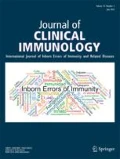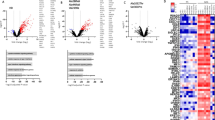Abstract
Purpose
Biallelic loss-of-function variants in IKBKB cause severe combined immunodeficiency. We describe a case of autoimmunity and autoinflammation in a male infant with a heterozygous gain-of-function (GOF) IKBKB variant.
Methods
Case report and review of the literature. We performed in silico variant analysis, measurement of plasma soluble biomarkers associated with immune activation, functional stimulation of patient peripheral blood mononuclear cells, and functional validation of variants transduced in Jurkat cells.
Results
A patient with two heterozygous IKBKB variants (E518K and T559M) presents with previously undescribed autoimmune cytopenias and autoinflammation. He had decreased TNF-α-induced IkBα degradation in vitro, and had increased serum biomarkers associated with macrophage recruitment and activation. Jurkat cells transduced with the IKKb T559M variant showed increased basal levels of phosphorylation of IKKα/b and p65, and higher degradation of IkBα suggesting a GOF mechanism. No significant changes were observed in Jurkat cells transduced with the E518K variant.
Conclusions
A GOF variant in IKBKB may associate with autoinflammation and autoimmunity highlighting a novel clinical phenotype.



Similar content being viewed by others
Abbreviations
- AIHA:
-
Autoimmune hemolytic anemia
- AIN:
-
Autoimmune neutropenia
- SCID:
-
Severe combined immunodeficiency
- IKK2:
-
Inhibitor kappa B kinase 2
- IVIG:
-
Intravenous immunoglobulin
- NF-κB:
-
Nuclear factor kappa B
- PBMC:
-
Peripheral blood mononuclear Cells
- WT:
-
Wild-type
References
Pannicke U, Baumann B, Fuchs S, Henneke P, Rensing-Ehl A, Rizzi M, et al. Deficiency of innate and acquired immunity caused by an IKBKB mutation. N Engl J Med. 2013;369(26):2504–14.
Cardinez C, Miraghazadeh B, Tanita K, da Silva E, Hoshino A, Okada S, et al. Gain-of-function IKBKB mutation causes human combined immune deficiency. J Exp Med. 2018;215(11):2715–24.
Abbott J, Ehler AC, Jayaraman D, Reynolds PR, Otsu K, Manka L, et al. Heterozygous IKKbeta activation loop mutation results in a complex immunodeficiency syndrome. J Allergy Clin Immunol. 2021;147(2):737-40 e6.
Pettersen EF, Goddard TD, Huang CC, Couch GS, Greenblatt DM, Meng EC, et al. UCSF Chimera–a visualization system for exploratory research and analysis. J Comput Chem. 2004;25(13):1605–12.
Shapovalov MV, Dunbrack RL Jr. A smoothed backbone-dependent rotamer library for proteins derived from adaptive kernel density estimates and regressions. Structure. 2011;19(6):844–58.
Abers MS, Delmonte OM, Ricotta EE, Fintzi J, Fink DL, de Jesus AAA, et al. An immune-based biomarker signature is associated with mortality in COVID-19 patients. JCI Insight. 2021;6(1):e144455.
Karczewski KJ, Francioli LC, Tiao G, Cummings BB, Alfoldi J, Wang Q, et al. The mutational constraint spectrum quantified from variation in 141,456 humans. Nature. 2020;581(7809):434–43.
UniProt C. UniProt: the universal protein knowledgebase in 2021. Nucleic Acids Res. 2021;49(D1):D480–9.
Liu S, Misquitta YR, Olland A, Johnson MA, Kelleher KS, Kriz R, et al. Crystal structure of a human IkappaB kinase beta asymmetric dimer. J Biol Chem. 2013;288(31):22758–67.
Polley S, Huang DB, Hauenstein AV, Fusco AJ, Zhong X, Vu D, et al. A structural basis for IkappaB kinase 2 activation via oligomerization-dependent trans auto-phosphorylation. PLoS Biol. 2013;11(6):e1001581.
Israel A. The IKK complex, a central regulator of NF-kappaB activation. Cold Spring Harb Perspect Biol. 2010;2(3):a000158.
Mousallem T, Yang J, Urban TJ, Wang H, Adeli M, Parrott RE, et al. A nonsense mutation in IKBKB causes combined immunodeficiency. Blood. 2014;124(13):2046–50.
Burns SO, Plagnol V, Gutierrez BM, Al Zahrani D, Curtis J, Gaspar M, et al. Immunodeficiency and disseminated mycobacterial infection associated with homozygous nonsense mutation of IKKbeta. J Allergy Clin Immunol. 2014;134(1):215–8.
Qin T, Jia Y, Liu Y, Dai R, Zhou L, Okada S, et al. A novel homozygous mutation destabilizes IKKbeta and leads to human combined immunodeficiency. Front Immunol. 2020;11:517544.
Mussbacher M, Salzmann M, Brostjan C, Hoesel B, Schoergenhofer C, Datler H, et al. Cell type-specific roles of NF-kappaB linking inflammation and thrombosis. Front Immunol. 2019;10:85.
Nemeth J, Stein I, Haag D, Riehl A, Longerich T, Horwitz E, et al. S100A8 and S100A9 are novel nuclear factor kappa B target genes during malignant progression of murine and human liver carcinogenesis. Hepatology. 2009;50(4):1251–62.
Simard JC, Cesaro A, Chapeton-Montes J, Tardif M, Antoine F, Girard D, et al. S100A8 and S100A9 induce cytokine expression and regulate the NLRP3 inflammasome via ROS-dependent activation of NF-kappaB(1.). PLoS One. 2013;8(8):e72138.
Afonina IS, Zhong Z, Karin M, Beyaert R. Limiting inflammation-the negative regulation of NF-kappaB and the NLRP3 inflammasome. Nat Immunol. 2017;18(8):861–9.
Krainer J, Siebenhandl S, Weinhausel A. Systemic autoinflammatory diseases. J Autoimmun. 2020;109:102421.
Acknowledgements
Molecular graphics and analyses performed with UCSF Chimera, developed by the Resource for Biocomputing, Visualization, and Informatics at the University of California, San Francisco, with support from NIH P41-GM103311.
Funding
This research was supported by the Division of Intramural Research, National Institute of Allergy and Infectious Diseases, National Institutes of Health (NIH).
Author information
Authors and Affiliations
Contributions
KS, HSK, TK, NA, KDBK, KD, OD, LDN, SDR, and MDK performed the research, analyzed data, and wrote the manuscript.
LS, BD, and VB contributed data and edited the manuscript.
Corresponding author
Ethics declarations
Ethics Approval
The patient’s family provided informed consent for study participation and dissemination of results on a protocol that was approved by the IRBs of both the National Institutes of Health and Children’s National Hospital in accordance with the Declaration of Helsinki.
Consent to Participate
Consent for publication was obtained from parents.
Conflict of Interest
MDK has received income from Uptodate, which was not felt to be in conflict with this research. All other authors declare no conflicts of interest related to this work.
Additional information
Publisher's Note
Springer Nature remains neutral with regard to jurisdictional claims in published maps and institutional affiliations.
Supplementary Information
Below is the link to the electronic supplementary material.
Rights and permissions
About this article
Cite this article
Sacco, K., Kuehn, H.S., Kawai, T. et al. A Heterozygous Gain-of-Function Variant in IKBKB Associated with Autoimmunity and Autoinflammation. J Clin Immunol 43, 512–520 (2023). https://doi.org/10.1007/s10875-022-01395-2
Received:
Accepted:
Published:
Issue Date:
DOI: https://doi.org/10.1007/s10875-022-01395-2




